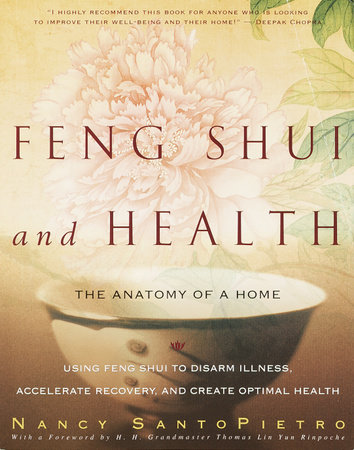Chapter 1
feng shui is a design system based on the flow of energy (ch'i) through your home or environment. It differs from the principles of traditional interior design, which bases its concepts mainly on function, form, and aesthetics.
Although Feng Shui has been around for more than 4,000 years, Westerners first began to become aware of it in the mid-1980s, and it became popular in mainstream society in the 1990s. There are three main schools of thought in Feng Shui, but this book will exclusively address the nontraditional school of what is known as the Black Hat Sect. Unlike other schools, which utilize a compass (Lo' Pan), the Black Hat Sect uses entranceways and a mapping system called the Bagua to determine location and proper positioning.
But, no matter what the school of thought is, the primary objective of Feng Shui is always to create home and work environments that are in alignment with the healing forces of nature, thus creating spaces that naturally support and nurture the individuals who occupy them.
When these patterns of invisible energy are aligned, they produce environments that strengthen all the different circumstances an individual will encounter during his or her lifetime. Although the connection between Feng Shui and career opportunities, personal relationships, and finances is becoming better understood, until now, the connection to health has been less so.
As you further explore concepts of vibrational patterns, you will begin to see energy patterns both within an individual and within an environment. Collectively, these two forms of patterns can create balanced and healthy energy patterns or unbalanced and unhealthy patterns of energy. Such patterns, when left uncorrected, can aggressively cause blocks in your career, poor health, illness and disease, dissatisfaction in your love life, and difficulties with your finances. By learning to assess and analyze vibrational patterns and the Feng Shui of your environment, you will be able to tap in to a new approach to understanding, diagnosing, and treating illness, and attending to your own health.
As you begin to work with Feng Shui concepts to improve your health, it is important to remember that the art of Feng Shui, so rich in metaphors, will mirror your health and life back to you as you subconsciously re-create them in your environment. It will manifest and reveal all the aspects of your health that you are not able to see objectively. Interpreted correctly, the Feng Shui of your environment will reflect back to you all the emotional, spiritual, physical, conscious, unconscious, and subconscious issues that are contributing to many aspects of your disease. It will provide you with an objective, tangible way to expose the hidden pieces of your illness as revealed in your home. Then, by making energy changes and corrections to your environment, you can dismantle the part of your illness that is being supported by unhealthy energy patterns and design layouts.
This book will gently invite you to look at your life, your home, and your health from a new perspective. It will challenge you to rethink illness from an understanding that our home and office environments have a direct impact on the quality and status of our health.
As you explore these principles, you might be surprised to find that there are many ways to assess the Feng Shui and health status of your home. Although many factors play into why and how an individual gets sick, working with the Feng Shui of a space can help create the necessary energetic foundation to support the process of health and healing. By learning to decipher the hidden health codes in our environment, we can furnish, decorate, and design our homes so that we unlock health issues that have plagued us for years. The principles of Feng Shui and health supply us with the understanding of how our environment affects our well-being from an invisible-energy perspective. By putting logical thought to one side for just a moment, you might see the other side of the invisible coin. By allowing yourself to abandon rational thinking momentarily, you may also discover a missing link to your own recovery process.
When we willingly get out of our own way and open ourselves to the higher wisdom that is available to us all, we move toward not only healing what ails us, but also toward transforming our whole lives along the way.
The information throughout this book is cutting-edge "spiritual technology" at its best. But keep in mind that although it is progressive and supportive, it represents only one component of why we get sick. Do not exchange good common sense for a quick Feng Shui fix. That would be a misuse of Feng Shui's many gifts. If you are sick or not feeling well, please remember to seek the appropriate medical help. Feng Shui is a strong and powerful medicine, but only when used responsibly as an adjunct to other healing methods. Different healing methods can strengthen and support one another. The more approaches we use to heal ourselves, the more we increase our chances of transforming that illness.
So pull out all the stops, call on the powers that be, and, above all, take action. "Your health is your wealth," and you deserve the best of all that is now being made available to you!
"If you are in the ocean and feel yourself beginning to drown,
pray to God, but start swimming toward the shore, also!"
=proverb
good health begins with
the land
The more we understand the nature of illness and explore the impact of environment on disease, the more we can take responsibility for changing the aspects that we do have control over, with the environment being the main one.
At the beginning of the Feng Shui assessment process, most people know very little about the principles of Feng Shui. Often they have read books or articles on the subject containing conflicting information that only serves to confuse them.
The best and least overwhelming way to approach the Feng Shui assessment is to start with a thorough step-by-step process. By looking at all the variables and their impact on one another, you can start to create an "energetic profile" of your space and all its surroundings. In this way you can slowly start to discover areas of your home that are contributing to poor health and are in need of your love and attention.
The first thing you need to remember is that energy (or ch'i) is created through a process that involves many steps, on many levels. If you are going to work with it, assess it, and modify its constitution, it then becomes very important that you understand as best you can where it comes from and how it eventually arrives at your home affecting your life and subsequently your health.
assessing the ch'i of the land
Keep in mind that the closer the ch'i from the universe gets to the individual, the stronger becomes its effect on human ch'i. For instance, the ch'i that's around your bed will affect you more profoundly than will the ch'i that circulates throughout your country of origin. Conversely, human ch'i, as it extends outward, has a direct impact on the world and all the things in it.
The Circle of Life
The initial source of ch'i is the universe. The stars, the moon, the sun, and other celestial bodies radiate ch'i that filters down through Earth's atmosphere, eventually reaching the planet's surface. The ch'i then divides, and is distributed throughout the world. As it circulates through the various countries, it divides even further, funneling itself into states, cities, neighborhoods, communities, acres, and blocks. Finally it arrives at our apartment buildings and homes, making its way through the individual rooms, circulating around furniture and various objects, and eventually affecting the ch'i of all the occupants.
As the ch'i circulates throughout your home, it merges with the energy emitted by other elements in the environment, such as the color of the walls, the shapes of the rooms, and the positioning of the furniture, and the combinations create certain forms and invisible energy patterns. These patterns of energy then shape the ch'i that exists in our bodies and in our external energy system called The Chakras. The ch'i in our bodies transmits these energy patterns to the world, drawing to us, like a magnet, certain life situations (relationships, jobs, health issues, etc.) that reflect those same energy patterns.
In turn, these different life situations also have very specific energy patterns of their own, which send ch'i back to our immediate environment, our neighborhoods, our communities, and eventually back to the universe. This energy exchange fuels and operates the "circle of life" (see Fig. 1).1
Learning how to detect the flow of ch'i throughout your house allows you to locate the areas where energy is blocked, stagnant, oppressive, or flowing too strongly. Any energy imbalance can trigger or lead to various illnesses. The assessment of ch'i in your home-its Feng Shui-will give you the information you need to make the proper adjustments to bring the ch'i back to its natural balance. Such adjustments may be as simple as moving your desk into a better energy position, adding extra light to a room, or simply changing the color of your bedroom. By learning how to work with energy to design the interior of your home, you can ultimately shape and alter your health and the many different situations in your life.
Although ch'i emanates from a variety of universal sources such as the tide and the moon, just before it enters your home it is actually filtered down from the next higher level of energy, found on the land on and around your property. Before we begin to address the inside of your home, we first have to look at the Feng Shui of the surrounding area. The quality of that exterior energy and the uninterrupted flow of its ch'i has an immediate and powerful impact on the interior ch'i-how it flows through your home will determine how it affects your health and your life.
The environment around you is full of clues that can alert you to energetic problems. Your job is to decipher the clues and then begin to make the changes necessary to correct those conditions. Keep in mind that there are hundreds of such possible exterior factors, far too numerous to list here. If you know the right questions to ask yourself, and if you remain open to making discoveries of your own, you will be well on your way to doing a thorough health and Feng Shui assessment of your space and its surrounding areas.
The Ch'i of the Land
As you gather information about your land, you will be looking for specifics as well as an overall assessment of all the exterior factors. Some of these things might have a significant impact on your health, while others, depending on how they affect your interior Feng Shui and you yourself, may have no impact at all.
Keep in mind that as soon as you decide to begin the Feng Shui process for yourself or for someone else, everything becomes important. Pay attention to everything that comes to mind. Aspects of your home and surroundings that you have never noticed before may suddenly be brought to your attention as you become ready to decipher their hidden messages. So be alert as you start this process, and keep an eye out for everything that crosses your path, whether you are assessing a new space or just taking a fresh new look at your old digs.
1. People, neighbors, events. For starters, examine the types of people who have chosen to live in your neighborhood. I know this suggestion might sound "loaded" and raise a few eyebrows, but try to honestly observe who is around you without being too judgmental. Sometimes we are so invested in doing the "politically correct" thing that we overcompensate and avoid seeking the truth at all costs. The reason for looking at this factor is that from a Feng Shui perspective, the universal laws of energy always rule. Energetically speaking, one of the main universal laws is "Like attracts like." This law applies significantly to the ch'i of the land because the land existed independently before anyone moved onto it.
So, if you find that you are surrounded by individuals who are angry, rude, emotionally unbalanced, constantly in trouble with the law, abusing drugs, unemployed, or violent, you need to acknowledge that this type of ch'i exists around you. This doesn't imply that you are bad or wrong, or that your life and health will be permanently affected in some way. But as you start your Feng Shui health assessment, it should serve as an alert about what might be happening with the ch'i of the land and the surrounding neighborhood, for that energy, left unchecked, will eventually find its way into your home and subsequently into your life.
I am also aware that socioeconomic status at least partially determines where we live, especially in today's world. See if you can challenge yourself and look past your initial response to my suggestion. When I referred to "types of people," you may have thought I stopped just short of mentioning race and/or referring to a tenement slum, and that I was implying indirectly what I didn't have the nerve to say outright. If so, you were wrong. Everything I listed above, I have had to address in varying degrees in many of the neighborhoods I have worked in. Every problem that exists in society exists on every level of society. In the human race, no one is spared. I have worked in many affluent neighborhoods, with individuals who were very financially comfortable. What I found was that I never had to adjust my approach or my Feng Shui assessment process because of their financial status. They had the same fears, diseases, struggles, and worries that everyone else has. Actually, what I found was that it was even more difficult to wade through the denial and shame surrounding the white-collar crime, marital affairs, and substance abuse that came with certain neighborhoods and social circles.
So, with that in mind, step back and ask yourself about the quality and character of your neighbors. Energy is insidious. It moves around and affects all that it comes in contact with, especially people. And in turn, the people and their lives and life circumstances affect their neighborhood and all who live in it. And we also travel in "energy groups"; every neighborhood or apartment building is another "family of energy," a group of people who assemble for a period of time for reasons that may or may not be obvious. I believe there is a personal as well as a social karma that different groups choose to work on collectively. Sometimes those groups choose to expose themselves to certain environmental factors that trigger events they need to experience in their lives for their own souls' growth and sometimes for society's growth as well
Copyright © 2002 by Nancy SantoPietro. All rights reserved. No part of this excerpt may be reproduced or reprinted without permission in writing from the publisher.







